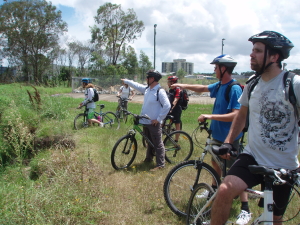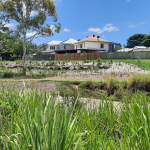Upcoming Events
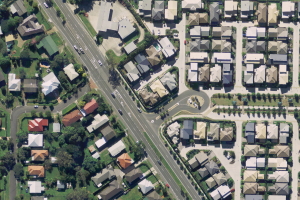
“The Death of the Backyard – An Issue for Stormwater” by Professor Tony Hall.
Tony will be present for approximately 45 minutes, with approximately 15 minutes for discussion/ questions. Finger food and drinks will be provided beforehand.
About the subject:
A substantial backyard has long been considered an iconic feature of Australian suburbs. From the air, they appear dominated by tree cover. Nevertheless, since the late 1990s, almost all new houses throughout the country have had minimal planted space around them. From above, they seem to be almost roof-to-roof. Taken together with the adjacent wide roads and concrete driveways, this clearly has severe adverse implications for stormwater run-off.
The issue is larger houses rather than higher densities. It appears driven by the trend towards greater debt, longer working hours and an indoor, air-conditioned, car-based lifestyle. Planning codes, while not actually encouraging the trend, do nothing to prevent it. It has serious ecological implications for the community as a whole, including a significant reduction not only in sustainable drainage but also in biodiversity and a beneficent microclimate.
About the author:
Tony Hall has been an Adjunct Professor within the Urban Research Program at Griffith University since 2004. He was previously Professor of Town Planning at Anglia Ruskin University, Chelmsford, UK. Rather unusually, he also served as a local councillor and led Chelmsford’s planning policy for seven years, obtaining a government award for quality of the built environment in 2003.
Tony’s book, The Life and Death of the Australian Backyard, was published by CSIRO Publishing in 2010 and won the 2012 Planning Institute of Australia National Award for Excellence in Cutting Edge Research.
To secure your place at the Seminar, download and complete the registration form via the following link: http://www.gemsevents.com.au/Resources/sq_feb_regoform.pdf
Should you have any questions about the event, please contact GEMS Event Management on +61 2 9744 5252 or via email to registration@gemspl.com.au.
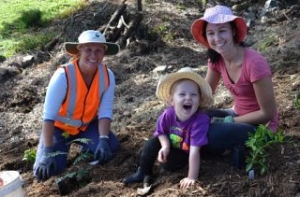
Expressions of interest for organisations, community groups and schools to host an event for the 2015 Connect to Your Creek Week are open now. Register your interest now!
The aim of Connect to Your Creek Week (held between 21-29 March 2015) is to improve waterway health by increasing community stewardship of local waterways so people value and care for their local creek. By connecting people to their creek in a fun and engaging way, we hope to increase community awareness and inspire action to protect our precious waterways.
Stormwater Queensland encourages our members to host and/ or participate in community event for Connect to Your Creek Week between 21-29 March 2015. Examples of events could include tree plantings, kayaking tours, litter cleanups, guided walks, documentary screenings, field trips, science talks or workshops.
Stormwater Queensland’s Brad Dalrymple said “Stormwater Queensland are currently planning our own event for Connect to Your Creek Week, and we’ll provide more details shortly.”
Hear the stories people are sharing about their special creek.

This one day bioretention design course provides training to enable better design and assessment of bioretention systems. The course compliments the Bioretention Technical Design Guidelines and covers advancements since publication of the guidelines.
By the end of this course participants will:
- be familiar with the design method for bioretention systems detailed in the Bioretention Technical Design Guidelines.
- have an appreciation of the science behind why and how bioretention systems work.
- be aware of and learn to apply urban design principles for bioretention systems.
- understand how to troubleshoot poorly functioning bioretention systems.
- understand common design mistakes and what to look for when reviewing or assessing designs for bioretention systems.
Presenters:
This course will be presented by Sally Boer (e2designlab) and Jack Mullaly (Healthy Waterways).
Who should attend?
Practitioners seeking a working understanding of bioretention system processes, assessment and design, including engineers, landscape architects, ecologists, planners and environmental scientists.
*Click here for further details and registration. Discount registration is available to Stormwater Queensland members.

Effective civil construction and landscape establishment of bioretention systems and wetlands is required to minimise costs and timeframes and realise the benefits of these systems. This one day course provides detailed step-by-step guidance on the construction and establishment of bioretention systems and stormwater wetlands in order to address the key issues faced during on-ground delivery.
By the end of this course participants will:
- have an appreciation of the importance of construction phase sediment and erosion control practices, and their relationship with operational phase stormwater management systems.
- have an understanding of specifications and materials.
- be introduced to construction methods for vegetated stormwater management systems.
- understand the requirements for successful vegetation establishment.
- understand the issues associated with asset handover.
- be provided with checklists and protocols that will inform construction, establishment and asset handover.
Presenters:
This course will be presented by Jason Sonneman (DesignFlow) and Jack Mullaly (Healthy Waterways).
Who should attend?
Those involved in the design, construction and establishment of vegetated stormwater management systems, including site supervisors, compliance officers, civil and landscape contractors, and civil and landscape consultants.
*Click here for further details and registration. Discount registration is available to Stormwater Queensland members.
Stormwater Queensland is delighted to invite you to the second WaterSmart Bus Tour to be held on Wednesday, 29th April 2015. The WaterSmart Bus Tour will be a fantastic opportunity to experience first-hand, a very broad range of catchment management projects and to hear about the challenges and solutions related to each project. This tour will also provide participants with the chance to learn directly from the practitioners involved in bringing the projects to fruition, with plenty of opportunities for questions, debate and discussion.
Sites to be featured on this Technical Tour include:
- Fitzgibbon Chase Urban Development Project: This innovate project site includes:
- The potable roofwater (PotaRoo) project which directs harvested roofwater to a central storage and treatment plant to potable quality for reuse.
- The Fitzgibbon Stormwater Harvesting (FiSH) scheme. The project collects urban stormwater runoff for filtering and disinfection prior to distribution via a 3rd pipe dual reticulation system for on-potable uses.
- Other examples of best practice Water Sensitive Urban Design (WSUD) (e.g. bioretention).
This project was the winner of the 2012 Australian Water Association (Qld) Infrastructure Innovation Award and the 2012 Healthy Waterways Water Sensitive Urban Design Award.
What made this project feasible and why isn’t this level of stormwater treatment applied on every residential development site?
- Pickering St, Enoggera – Natural Channel Design: This was the first attempt at ‘Natural Channel Design’ in Queensland. Lessons from this site continue to influence today’s guidelines and designs. Is the approach taken on this site transferrable to other creeks and what did we learn from this early example?
- Bennett Road, The Gap – fish passage retrofit project: This project aimed to restore fish passage through existing culverts by retrofitting a proprietary fishway. This project was the winner of the 2011 Healthy Waterways Industry Award. Why wasn’t a more natural approach used here and what does the post-construction fish monitoring data tell us about designing such systems?
- Kirralee Crescent, Upper Kedron – ‘Creek Filtration Trial Project’: This system was the first system constructed as part of a trial aimed at exploring low cost ways to managing stormwater in existing urban areas. This project was the winner of the 2014 Healthy Waterways Urban Renewal. Why wasn’t a regular bioretention system constructed here, what cost savings does it offer, is this ‘alternative’ design appropriate and can it be applied elsewhere?
Speakers will include: David Hamlyn-Harris (Bligh Tanner), Grant Witheridge (Catchment and Creeks), Ross Kapitzke (James Cook University), Damian Thompson (Lat 27), Mark Gibson (Brisbane City Council) and Paul Dubowski (BMT WBM).
Register your attendance now, as seats are limited! Click here to Register.
Presenters:
 |
David Hamlyn-HarrisDirector of Water and Environmental Engineering, Bligh Tanner
David is Director of Water and Environmental Engineering and has 34 years’ professional experience in the Australian water industry across all aspects of municipal water supply and wastewater engineering. David has a particular interest in local alternative water management systems, in particular the integration of stormwater harvesting, rainwater tanks and water recycling into urban water infrastructure. He has been responsible for major wastewater treatment plant upgrades and significant water infrastructure planning programs such as the Sydney Olympic Park water management systems and the Pimpama Coomera Waterfutures Master Plan on the Gold Coast. More recently, David has developed guidelines for stormwater harvesting for the Healthy Waterways Partnership; a feasibility study for roofwater and stormwater harvesting for potable use in Melbourne; and has completed several stormwater harvesting schemes including the South Bank Rain Bank and the Fitzgibbon FiSH and PotaRoo. |
 |
Grant Witheridge Grant Witheridge is a civil engineer working in the fields of Hydraulics, Stormwater Management, Waterway Management, Fish Passage, and Erosion & Sediment Control. He has both a Degree and Masters in Civil Engineering from the University of NSW. He has over 30 years of experience in the investigation, modelling and design of hydraulic structures, including 7 years at the University of NSW Water Research Laboratory.Currently Grant is working as an engineering consultant through his own company Catchments and Creeks Pty Ltd.He is the principal author of a number of technical publications including the Brisbane City Council Natural Chanel Design Guidelines, IECA Australasia 2008 Best Practice Erosion and Sediment Control documents, and the 2007 and 2013 editions of the Queensland Urban Drainage Manual (QUDM).Since 1996 Grant has conducted over 500 training courses in construction site erosion and sediment control, stormwater management and waterway rehabilitation. In 2009 Grant was presented with the inaugural ‘Neville Gibson Award’ for services to the stormwater industry by the Queensland Branch of the Stormwater Industry Association. In 2010 Grant was honoured with the ‘Sustained Contributor Award’ for 2009 by the International Erosion Control Association. |
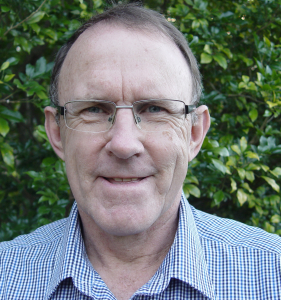 |
Ross Kaptzke Ross Kapitzke is an Environmental Engineer specialising in multipurpose planning and design for waterways, with a particular focus on fish passage design. Ross has worked through James Cook University as a consultant and in R & D in these fields for more than 20 years [http://www.jcu.edu.au/fishpassagedesign/]. He has developed specialist capability in assessment, design and evaluation for fish passage and stream rehabilitation; and in the design, development and testing of fish passage facilities for small waterway structures. Ross’s innovating work in this field has led to design and manufacturing of the award-winning Walaman prefabricated fishway system [http://walaman.com.au/].Ross has played a leading role in the development of fish passage solutions in Queensland for State Government, Councils and other clients. His work includes aquatic fauna connectivity impact assessment at catchment and road corridor scales, and concept design, detailed design and implementation of fish passage mitigation measures for a wide range of fish migration barrier problems. Ross is author of Culvert Fishway Planning and Design Guidelines (James Cook University 2010 – http://www.jcu.edu.au/fishpassagedesign/), and he continues to work on development and assessment of fishway design types and prefabricated fishway components in laboratory, field sites and prototype fishway facilities [http://www.youtube.com/walamanfishways]. |
 |
Damian Thompson Director, Lat 27 Damian is one of the founding directors of the multi-disciplinary design practice Lat27 and has practiced Landscape Architecture for over two decades. His design approach involves the creative interpretation of natural systems in ways that enrich the quality of urban communities. He has a long association with QUT as tutor and guest lecturer and co-founded the 2011 ‘flood of ideas’ project in support of disaster-resilient communities. |
 |
Mark Gibson Senior Engineer Water Management, Brisbane City Council Mark studied a Bachelor of Civil Engineering at the University of Queensland and while studying worked casually at Redlands City Council, Brisbane City Council and Geo-Eng (formally Neville Jones and Associates). Upon graduating Mark accepted a fulltime position at Geo-Eng, who straight away seconded him to Brisbane City Council Flood Management Department. After six months Mark took a fulltime position at the Council. In May 2004, Mark formed his own company, MRG Water Consulting Pty Ltd. MRG Water Consulting has specialised in flood risk management, stormwater quality improvement and assisting developers, mining firms and local government with tricky water issues. In the last 10 years the business has grown to 5 staff, (still small but good!) In 2012, Mark took a part time position at Brisbane City Council again, working in the Water Management Section. Mark works as the director of MRG water Consulting. Working at the Council has allowed Mark to focus on interesting projects such as the creek filtration systems. He is passionate about improving waterway health, reducing flood damage and risk and protecting our critical infrastructure. |
 |
Paul Dubowski Senior Environmental Scientist, BMT WBM Paul is a senior environmental scientist with 11 years of experience in the water industry. Since joining BMT WBM in 2010, he has worked across a range of fields including stormwater management, catchment management, ecology and environmental management. Paul has led numerous water sensitive urban design (WSUD) projects from conceptual design through to maintenance, strategic policy and planning, capacity building projects for local governments and catchment/waterways management initiatives. |

Vegetated Stormwater Assets require maintenance in order to deliver their stormwater management benefits. Maintaining vegetated stormwater assets doesn’t have to be difficult. This one day course provides detailed guidance on how to maintain bioretention systems and constructed wetlands as easily and cost effectively as possible.
By the end of this course participants will:
- be aware of the activities required to maintain bioretention systems and constructed stormwater wetlands.
- have an appreciation of the cost of maintaining bioretention systems and constructed stormwater wetlands.
- understand how bioretention design affects long term maintenance requirements, and how to design for low long term maintenance.
- be inspired by simple ways to rectify underperforming vegetated stormwater assets.
Presenters:
This course is presented by Jack Mullaly (Healthy Waterways)
Who should attend?
Those involved in designing and maintaining vegetated stormwater assets, including civil and landscape designers, development assessment officers, stormwater asset managers and maintenance coordinators.
*Click here for further details and registration. Discount registration is available to Stormwater Queensland members.
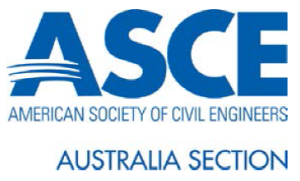
The ASCE Australia Section will be holding a Master Class in Brisbane on the Principles of Streambank Analysis and application of the Bank Stability and Toe-Erosion Model (BSTEM). It will be presented by Dr Andrew Simon.
The master class will be held in the Cardno Training Room, Level 11, Green Square North Tower, 515 St Pauls Terrace, Fortitude Valley on Monday 25 May 2015.
Please click here for the attached flyer that describes the Master Class Program.
Dr Andrew Simon is a geomorphologist with 30 years of experience in mechanistic analysis of unstable-channel systems, streambank erosion, cohesive-sediment entrainment, the role of riparian vegetation, “reference” sediment-transport rates, and river restoration, working on projects throughout the United States, in Queensland, NSW, New Zealand and elsewhere around the globe.
He has advised that the mathematics is cursory and is used to understand the processes. The master class works for non-engineers as well. He has received excellent reviews from managers, biologists and landscape architects alike.
It is open to all who would like to attend the Master Class
Registrations are open until Thursday 21 May 2015. Don’t miss your opportunity to attend. To Register click here.

Visit the Conference Website, please click here.
On behalf of the Conference Committee, we are pleased to announce that the 2015 Stormwater Queensland Conference will be held on Wednesday, 15th and Thursday, 16th July, with a Technical Tour to be held on Friday, 17th July. The two-day Conference will be held at The Armitage Centre, Empire Theatre in Toowoomba.
In recent years, more sustainable water management has been a key focus of the ‘Garden City’. In 2009, the city’s water supply was at an all-time low of 7.7%, leading to major water restrictions, a proposed (and subsequently rejected) indirect potable re-use scheme, and the construction of a $187 Million pipeline from Wivenhoe Dam. In January 2011, however, the city and surrounding areas were devastated by flash flooding.
With significant growth predicted in the region, Toowoomba Regional Council is committed to managing its water cycle more sustainably, including the extreme events. Council’s goals are to “plan and deliver safe and effective stormwater management outcomes and a flood resilient region” and “advance water use efficiency and water cycle innovation throughout the region” (Toowoomba Regional Council Corporate Plan, 2014-19).
This Conference provides a unique opportunity to bring together the best and brightest minds within the stormwater industry in Queensland (and beyond) to share and gain knowledge, experience and expertise – and build strong collaborative partnerships.
As in past years, we aim to build a strong conference program that will provide an opportunity for delegates to learn from the experience of others on a broad range of topics, and continue to provide these stormwater professionals with an insight into the key factors that have resulted in successful urban water management projects across Queensland.
If you would like to receive further information about the 2015 Stormwater Queensland Conference, please contact GEMS Event Management on +61 2 9744 5252.
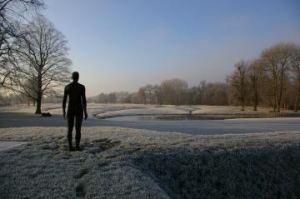
On behalf of Stormwater Queensland, we are pleased to announce that we are holding our very first Winter School Program this August. The Stormwater Queensland August Winter School will feature Workshops conducted by Grant Witheridge (Catchment and Creeks), Jack Mullaly and Andrew O’Neill (Healthy Waterways). The school will be held over a period of five days and allows you to choose individual daily workshops, which suit your needs and to improve your knowledge and skills in stormwater quantity and quality design.
To register for one or more of the workshops, to be held as part of the Stormwater Queensland August Winter School, click here.
Workshop Schedule
| Monday, 31st August | Workshop 1 – Application of the Rational Method and Aspects of Piped Drainage Design Presenter: Grand Witheridge |
| Tuesday, 1st September | Workshop 2 – Water Sensitive Urban Design (WSUD) Principles and Concept Design Presenters: Jack Mullaly and Andrew O’Neill |
| Wednesday, 2nd September | Workshop 3 – Design of Stormwater Outlets and Design of Fauna Sensitive Waterway Crossings Presenter: Grant Witheridge |
| Thursday, 3rd September | Workshop 4 – Water Sensitive Design (WSUD) Detailed Design Presenters: Jack Mullaly and Andrew O’Neill |
| Friday, 4th September | Workshop 5 – Treatment of Creek Erosion and Natural Channel Design Presenter: Grant Witheridge |
Workshop Outlines
The following Workshops will be presented over the five days of the Stormwater Queensland August Winter School:
Workshop 1 (Part 1) – Application of the Rational Method
Introduction to the various hydrological methods used to determine design discharge or small to medium catchments. Detailed discussion is provided on the application of the Rational Method and the various procedures as presented within the Queensland Urban Drainage Manual for the determination of time of concentration. It is hoped that the Workshop will also provide students with an update on AR&R attitude to the continued use of the Rational Method in drainage design.
Workshop 1 (Part 2) – Aspects of Piped Drainage Design
This workshop has been developed for practitioners who have past experience in stormwater drainage design. Discussion is provided on the reasoning behind many of the design rules used in pipe drainage design. The workshop reviews hydraulic gradeline (HGL) analysis, structure losses, methods to achieve a reduction in pit losses, and the hydraulics of inlet structures.
Workshop 2 – Water Sensitive Urban Design (WSUD) Principles and Concept Design
This workshop will focus on the application of WSUD to reduce the impact of urbanisation and meet state and LG policy requirements. The workshop will include training on implementing WSUD principles, WSUD concept design and integration. This will include practical exercises in WSUD concept design that can be highly valuable when preparing stormwater management plans.
Workshop 3 (Part 1) – Design of Stormwater Outlets
This workshop reviews the design of stormwater outlets, and their integration into various receiving environments, including discussion on aesthetics, headwall design, pubilc safety, inlet and outlet screens, erosion control, maintenance and water quality issues.
Workshop 3 (Part 2) – Design of Fauna Sensitive Waterway Crossings
This workshop focuses on the design of various types of waterway/roadway crossings, with the aim of minimising their impact on aquatic and terrestrial fauna passage. The workshop reviews design and rehabilitation of waterway culverts.
Workshop 4 – Water Sensitive Urban Design (WSUD) Detailed Design
This workshop will focus on the detailed design of wetlands, bioretention and swales. This workshop will include working through a detailed “WS design”, also considering a number of other aspects of stormwater drainage design, that has been included in other Winter School workshops (e.g. outlets, hydraulic calculations, etc).
Workshop 5 (Part 1) – Treatment of Creek Erosion
This is a practical-based workshop on the various forms and causes of creek erosion, providing detailed discussion on the selection and application of a wide range of treatment techniques. The primary focus of the workshop is on the use of natural materials, such as vegetation and rock to control creek erosion.
Workshop 5 (Part 2) – Natural Channel Design
This workshop introduces the concepts of Natural Channel Design (NCD) for use in the design of drainage channels and the rehabilitation of minor watercourses, within heavily modified catchments. The workshop will also discuss some of the lessons learnt since the release of Brisbane City Council’s NCD Guidelines of 2000.
Registration Fees
Stormwater Queensland are committed to providing high quality professional development opportunities to our members. As the August Winter School is a new initiative of the Association, Stormwater Queensland have subsidised the Workshop registration fees by more than 50% of their full value.
| (Fee per Full Day Workshop) | |
| Member | $250.00 |
| Non Member | $350.00 |
| Student | $50.00 |
Please Note: For Participants wishing to attend multiple Workshops, a 20% discount will be applied.
Registration to attend these Workshops includes Morning Tea, Lunch and Afternoon Tea.
Should you have any questions regarding registration, please email registration@gemspl.com.au.
If you would like to know more about the Stormwater Queensland August Winter School, please contact Stormwater Queensland on 1300 721 220.


